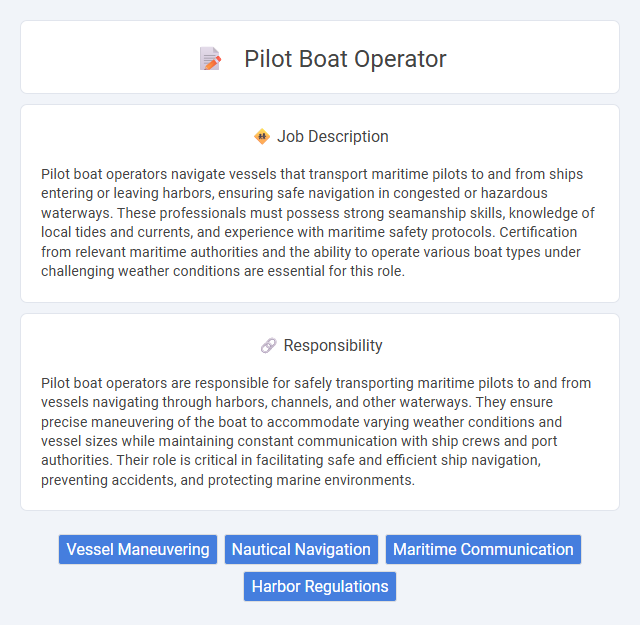
Pilot boat operators navigate vessels that transport maritime pilots to and from ships entering or leaving harbors, ensuring safe navigation in congested or hazardous waterways. These professionals must possess strong seamanship skills, knowledge of local tides and currents, and experience with maritime safety protocols. Certification from relevant maritime authorities and the ability to operate various boat types under challenging weather conditions are essential for this role.
Individuals with strong physical fitness and excellent spatial awareness are likely suitable for a pilot boat operator role, as the job often demands navigating rough seas and precise maneuvering near large vessels. Those who can maintain calm under pressure and possess strong communication skills have a higher probability of succeeding in this dynamic, high-responsibility environment. Candidates with a passion for maritime operations and the ability to work irregular hours may find this career particularly fitting.
Qualification
Pilot boat operators must possess strong maritime navigation skills and comprehensive knowledge of local waterways. Certification requirements typically include a valid maritime license, such as the Merchant Mariner Credential (MMC) or relevant Coast Guard endorsement. Experience in vessel handling, safety protocols, and communication systems is essential to ensure efficient and secure pilot transfers.
Responsibility
Pilot boat operators are responsible for safely transporting maritime pilots to and from vessels navigating through harbors, channels, and other waterways. They ensure precise maneuvering of the boat to accommodate varying weather conditions and vessel sizes while maintaining constant communication with ship crews and port authorities. Their role is critical in facilitating safe and efficient ship navigation, preventing accidents, and protecting marine environments.
Benefit
Pilot boat operators likely benefit from competitive salaries due to the specialized skills required in navigating challenging marine environments. There is a probable opportunity for steady employment given the essential role they play in guiding large vessels safely to port. Benefits may also include physical activity and on-the-job experience that enhance maritime proficiency and career advancement prospects.
Challenge
The pilot boat operator job likely presents significant challenges involving navigating rough seas and tight docking situations, requiring exceptional skill and quick decision-making. Operators probably face unpredictable weather conditions and must maintain precise communication with ships and harbor authorities to ensure safety. The role demands high vigilance and physical endurance, as mistakes can lead to serious accidents or delays.
Career Advancement
Pilot boat operators can advance their careers by gaining extensive maritime experience and acquiring specialized certifications such as the Master License or Advanced Pilot Endorsements. Progression often involves moving into senior pilot roles, maritime safety management, or training new pilots, enhancing leadership skills and operational expertise. Opportunities in larger ports or with major shipping companies provide further potential for higher salaries and increased responsibilities.
Key Terms
Vessel Maneuvering
Pilot boat operators expertly maneuver vessels in challenging and congested waterways, ensuring safe navigation to and from ports. Their skillful handling of the pilot boat facilitates the transfer of maritime pilots onto large ships, requiring precise control and deep understanding of vessel dynamics. Mastery in vessel maneuvering minimizes collision risks and enhances overall maritime safety during critical docking and undocking operations.
Nautical Navigation
Pilot boat operators expertly handle vessels that transport maritime pilots between land and ships, ensuring safe navigation through challenging waterways and busy ports. They utilize advanced nautical navigation techniques, including radar, GPS, and real-time marine traffic monitoring, to maneuver accurately in various weather and sea conditions. Mastery of maritime regulations and close communication with port authorities and ship crews is essential for preventing collisions and facilitating efficient vessel docking and departure.
Maritime Communication
Pilot boat operators specialize in maritime communication to coordinate the safe transfer of pilots to and from vessels navigating harbors and ports. They utilize advanced radio systems, GPS, and radar technology to maintain constant contact with ship captains, harbor authorities, and the pilots onboard. Effective communication ensures the precise timing and positioning required to facilitate safe navigation and prevent maritime accidents.
Harbor Regulations
Pilot boat operators ensure compliance with harbor regulations by expertly navigating vessels through congested port areas while adhering to safety protocols and maritime laws. Their knowledge of local harbor rules, including speed limits, communication procedures, and environmental restrictions, is critical for preventing accidents and protecting marine ecosystems. Effective coordination with port authorities and continuous monitoring of regulatory updates enable pilot boat operators to maintain secure and efficient harbor operations.
 kuljobs.com
kuljobs.com